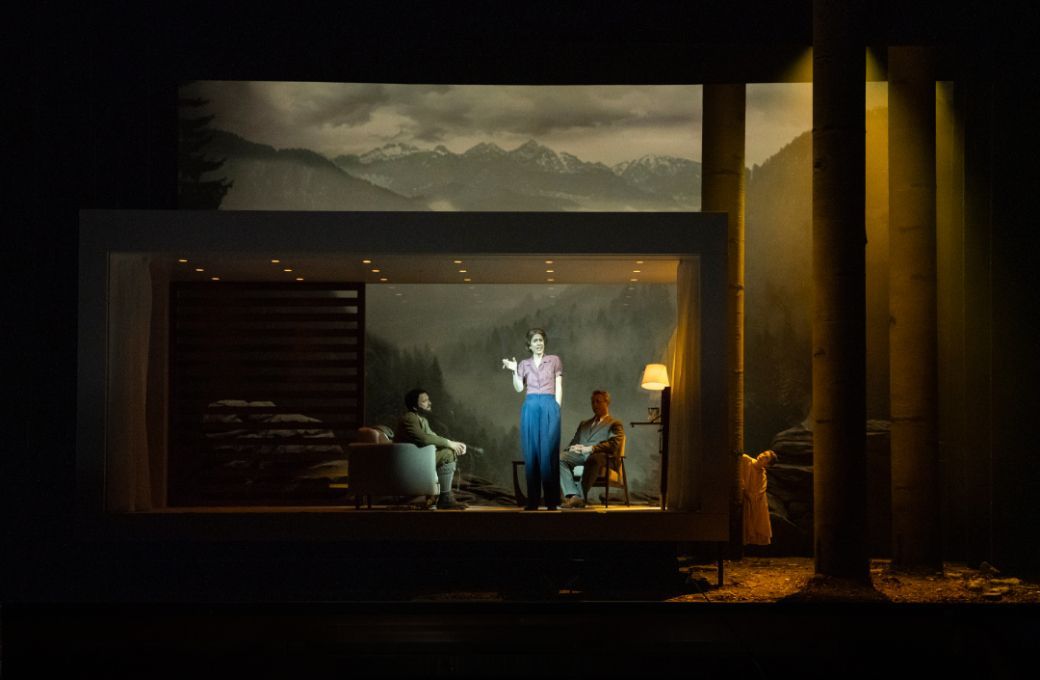Given the paucity of chances for UK audiences to experience opera outside our main cities, it seems odd that the nation’s core purveyor of lyric theatre to the regions should have selected a work by Judith Weir for its autumn tour. Artistic director Robin Norton-Hale directs with skill and flair, a quartet of fine artists sing the hell out of it and ETO's orchestra creates some gorgeous textures… but why did English Touring Opera choose Blond Eckbert? What’s that all about?

The second of these questions begs the first. Judith Weir’s cryptic folk opera has been around for 30 years and from time to time it gets rediscovered by a new generation, especially since the composer’s later chamber reduction became canon. Small orchestra, no chorus, all done in under an hour, all with the warm glow of doing your bit for contemporary music, it is a welcome visitor in music colleges and experimental studios. On a wider public tour, though? I'm not so sure.
If this is beginning to seem churlish, let me put it in perspective. I liked nearly everything about this new production – first seen at the 2024 Aldeburgh Festival – from the panache of Eleanor Bull’s modern indoor designs (a touch too Abigail’s Party, perhaps) to the detailed direction of all four players from Aoife Miskelly’s narrator figure, the all-seeing Bird, to Flora McIntosh’s Berthe, the wife of Weir’s title character. The latter forswears Demis Roussos in order to tell a fragmentary tale of her childhood, a lengthy monologue whose narration has unexpected consequences for the two male characters in particular.
Alex Otterburn, one of the most exciting baritones of his generation (somebody cast him as Billy Budd before it’s too late) works wonders with the under-characterised title role. Do try to catch this dynamic stage animal at work even though his opportunities for display are limited here. Otterburn is well matched by tenor William Morgan as the enigmatic Walther, a friend who knows too much and for whom a grisly end awaits.
The score is fresh and reassuring in its terse but beguiling sense of melody and the warm colours of Weir's own orchestral reduction for just 13 instruments, a palette that’s dominated by some especially rich woodwind writing. Moreover, the show, set simultaneously in interior and exterior locations, is exquisitely lit by Jamie Bull. Yet the nagging frustration of Blond Eckbert persists: what’s it all about? The drama, based on a tale by the German Romantic Ludwig Tieck, leaves its pivotal mystery hanging in the air. It lacks the narrative propulsion necessary to enthral an audience, and without resolution there is no catharsis. Intellectually the opera may have clout but theatrically it’s poverty-stricken. While there’s a chance you’ll admire Blond Eckbert, I doubt you’ll love it.
ETO pads out the evening with a surprisingly lame pre-interval sequence of faintly dramatised but resolutely undramatic Lieder sung in a semi-bucolic landscape where, to paraphrase Joni Mitchell, they cut down a tree and put it in a tree museum. Abigail Kelly, Amy J Payne, Jack Dolan and Mark Nathan gave intelligent accounts of songs by, among others, Haydn, Beethoven and Schubert in subtle orchestrations by ETO’s outstanding music director, Gerry Cornelius. All fine of itself, although as a companion piece to the opera it was nicely sung, neatly staged and at 45 minutes about three-quarters of an hour too long.


